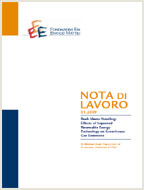The Grand Experiment of Communism: Discovering the Trade-off between Equality and Efficiency

12.07.2011
Etienne Farvaque, Alexander Mihailov, Alireza Naghavi
C72, D31, D63, D74, D83, P51
Capitalism, Communism, Inequality, Inefficiency, Ideology Transmission, Economic Transitions
Economy and Society
Giuseppe Sammarco
This paper aims to explain the rise and fall of communism by exploring the interplay between economic incentives and social preferences transmitted by ideology. We introduce inequality-averse and inefficiency-averse agents and analyze their conflict through the interaction between leaders with economic power and followers with ideological determination. The socioeconomic dynamics of our model generate a pendulum-like switch from markets to a centrally-planned economy abolishing private ownership, and back to restoring market incentives. The grand experiment of communism is thus characterized to have led to the discovery of a trade-o¤ between equality and efficiency at the scale of alternative economic systems. While our focus is on the long-run transitions from capitalism to communism and back observed in the course of the 20-th century, the model also derives conditions under which each of the systems can remain stable.
